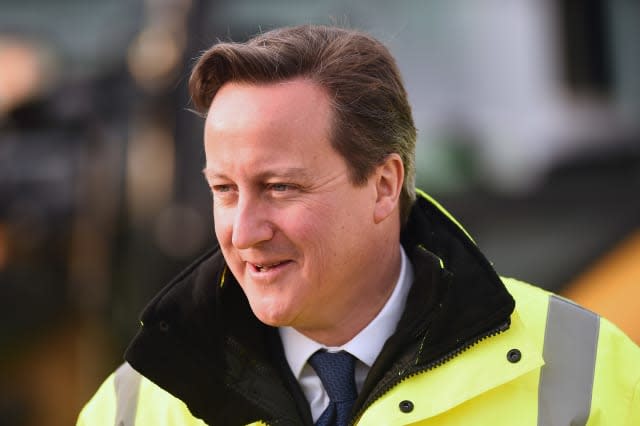Cameron reaffirms tax cuts pledge

David Cameron has insisted there is an economic, moral and practical case for tax cuts following the general election, as he used the latest in a series of campaign speeches to highlight Conservative promises to cut £7 billion from income tax.
But the Prime Minister did not spell out how he would pay for the tax giveaway, saying only that the party had a track record of lowering income tax at the same time as reducing Government spending.
And he confirmed plans for a further £30 billion spending cuts if Tories win the May 7 poll, including £13 billion from Whitehall department spending and £12 billion from welfare.
Mr Cameron said: "After the security of a job, the next best thing we can do is to cut people's taxes and let them keep more of their own money to spend as they choose. That's our aim."
He restated promises made at last year's Conservative conference to raise the personal allowance threshold below which workers pay no income tax to £12,500 and to increase to £50,000 the level at which the 40p tax rate kicks in.
In response to critics who have said that the pledges - together worth around £7 billion - are unfunded, Mr Cameron said: "How are we able to make them? Because we have a strong economy and because people can see the record of this Government.
"Under this Government, we've cut the deficit. We've had to make difficult decisions on spending to do that. But we have cut income tax at the same time and we can do it again in the next Parliament."
Mr Cameron said May's election offered a choice between "whether we have a government with competence, with grip, with a long-term economic plan, or whether we have the chaos of Ed Miliband in Downing Street and all that would mean".
But following speculation at the weekend about the SNP propping up a minority Labour administration, the PM added: "If there was anyone who thought the worst possible outcome of the election was an Ed Miliband-led Labour government, actually I can now tell you something that would be even worse, and that is Ed Miliband in Downing Street, supported by the Scottish National Party who want to break up our United Kingdom. The battle of this election has become even more important."
Mr Cameron insisted that his pledge of tax cuts was not a "vague promise", pointing to the coalition Government's record of lifting the income tax personal allowance to £10,000 during this Parliament.
But Deputy Prime Minister Nick Clegg retorted that this was a Liberal Democrat policy, which Mr Cameron opposed publicly at the time of the 2010 general election.
Lib Dems released footage on Twitter from the 2010 televised leaders' debates, when Mr Cameron rejected their proposal of a personal allowance hike, telling Mr Clegg: "I would love to take everyone out of their first £10,000 of income tax, Nick. It is a beautiful idea, it's a lovely idea. We can't afford it."
And Mr Clegg said: "Throughout this Parliament, the Tories have insisted on tax cuts for the few whereas the Lib Dems have insisted on tax cuts for the many."
In his speech in Hampshire, Mr Cameron set out the "economic case" for tax cuts: "A low-tax economy is a successful economy. When we cut taxes, we reward work, we reward enterprise, we reward effort, we make our economy more competitive."
He said the "moral case" for tax cuts was that "it is people's money, not the Government's money, so we should leave them with as much money to spend as we can, rather than frittering it away on wasteful Government projects".
And he said that the "practical case" was that "many people in our country want that greater financial security that we offer, so what we should be aiming to do, as well as getting them a job, is helping to leave them with more of their own money so they can afford the things that they want and the better life and the greater security that they need".
He said that raising the personal allowance from £10,600 to £12,500 would take one million low earners out of income tax, while increasing the threshold for the upper rate to £50,000 would benefit around 800,000 people earning over £42,000.
But he gave no details of the planned timetable for the changes, which Tory chief whip Michael Gove has previously suggested could be paid for from the budget surplus which Conservatives hope to achieve by 2019.
Jonathan Isaby, chief executive of the TaxPayers' Alliance pressure group, said: "The Prime Minister is right to commit to lowering taxes on hard-working people and all leaders should be looking to make similar pledges.
"However, Mr. Cameron's commitments aren't quite as generous as they first seem - he is not planning to raise the 40p threshold quickly enough to keep pace with inflation and, while a further increase in the personal allowance would be welcome, he has said nothing about what he would do with National Insurance, which is a second income tax in all but name."

Read more on AOL Money
PM: I won't tell you how much tax I pay
Cameron claims 8p off taxpayer
Cameron's tax promises "will isolate the young and poor"



